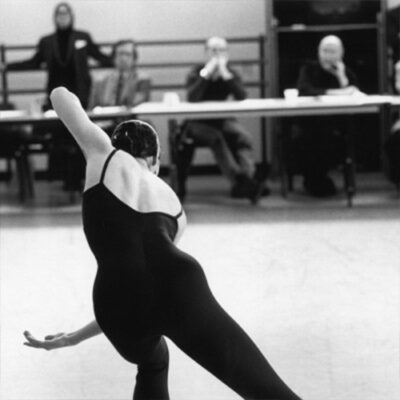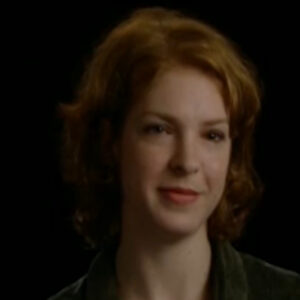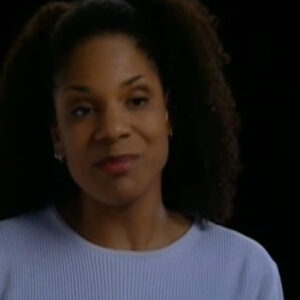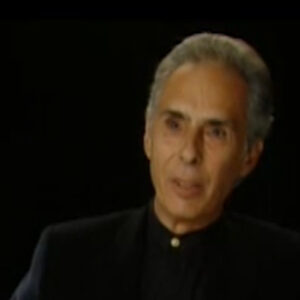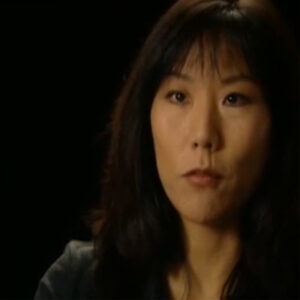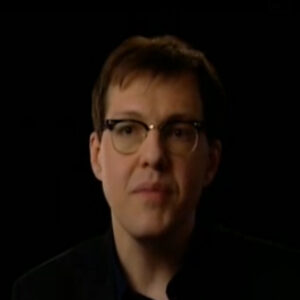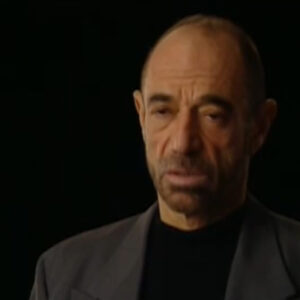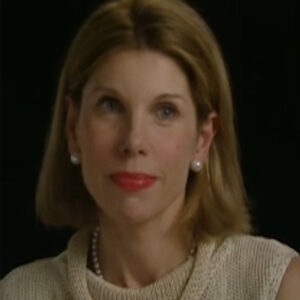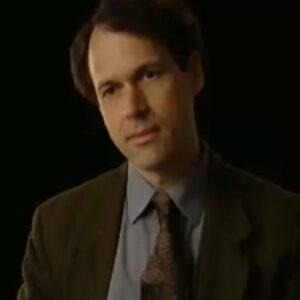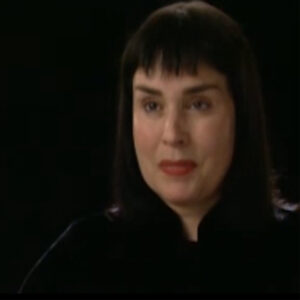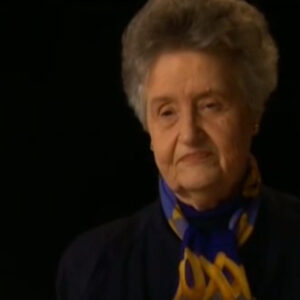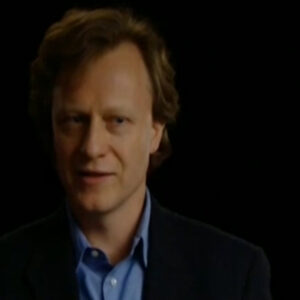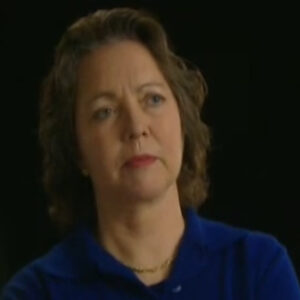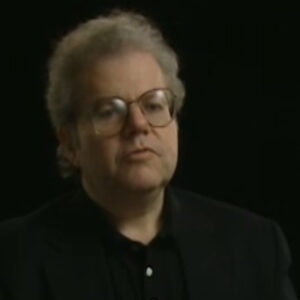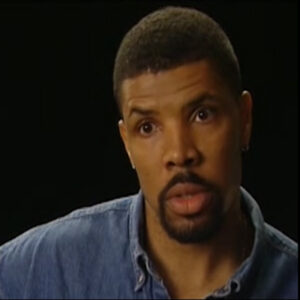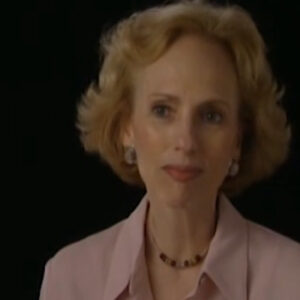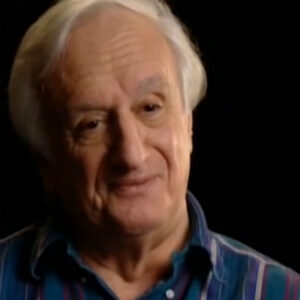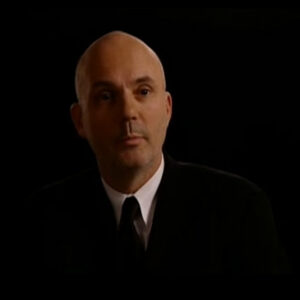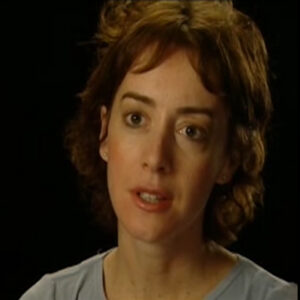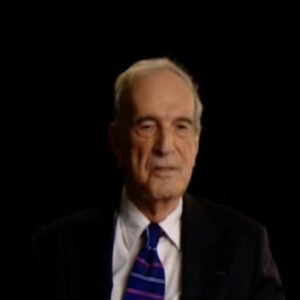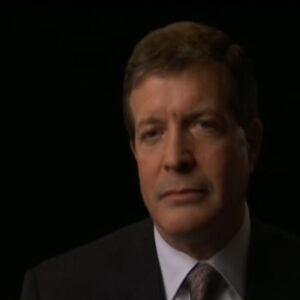Speaker It’s a strange thing because I’m from a Quaker family and they’re not a lot of Quaker actors because I think Quakers are sort of shy and live in white and beige houses. There are a lot of Catholic actors, a lot of Jewish actors where where there’s a lot of theatricality and incense and lighting. There are a lot of Quaker actors. So it was a strange thing. It was. I always knew that I wanted to do it. I was always attracted to it after it was really after seeing my brother, my older brother in a play and my older sister in a play. And I was a very early memory and it was the precise feeling of looking at a car wreck. I could not take my eyes off it, but I was horrified that they were putting themselves in this this vulnerable position of being the center of attention. Then I did an anti-smoking scare in sixth grade with my dog, and then I did a play in seventh grade arsenic and old lace. And from that moment on, it was really all I did even through I went to college before I went to Juilliard. And it was just what I really wanted to do.
Speaker It never occurred to me that you could actually do it for a living. I mean, it seemed like I mean, to this day, I was sending my wife the other day that I can’t believe I’m able to make a living doing it. A high school, extra curricular activity. You know, it could have been bell choir. If there was a professional bell choir league, I’d be doing it. But when you grow up in Wisconsin, you it doesn’t occur to you because there are no people who, you know, indirectly who are actors. It’s just not a possibility. It’s this sort of wonderful, fun thing to do. It was actually when I got into Juilliard after going to college for four years, that I remember realizing, oh, my God. I mean, you may end up doing this, being able to do this for a living, which was sort of shocking because it truly didn’t occur to me until the day that I got in. It was I was always just moving to the next step of the next play and the next performance.
Speaker And what did you mean?
Speaker What did you know about Juilliard? Where did you think when you thought about what did you do?
Speaker Training. What kind? Where? Oh, I know this school did it. How did it come to your attention?
Speaker It came to my attention, I think through.
Speaker I had seen Kevin Kline in a play, the Michael Weller play at that circle in the square and I and I and.
Speaker I thought he was a. I thought he was a really good actor and I noticed that that was where he went and I started asking some people and I had heard that we were sort of just becoming aware of of Robin Williams. I knew that Robin Williams had gone there. So it’s really through these sort of, you know, these these famous early guys that that I knew that they had a program. And I knew that. I knew that. I knew it had a reputation as a sort of rigorous. Place, which I was I was sort of attracted to, and I want to be in New York. New York was exciting to me. But I so I auditioned there. And at Yale.
Speaker What was the audition process?
Speaker The audition, the audition? It was fair, it was very strange because I remember it was Michael Kahn who was he’s now the head of the school.
Speaker With me, there were just hundreds of sort of the desperate young people, and you had to do all sorts of silly exercises, you had to, you know, fake that, that you were playing tennis against the wall. You had to you had to sing sing songs. And they sort of would walk up and look at your body and and look at your mouth. It sort of felt like a slave market as they would actually that the voice teachers would actually ask you to open your mouth. Yeah, they were looking for huge uvula. Is there something I know what they’re looking for. But but it was it was a very strange process. And they posted very quickly who was called back and. Then they brought you into the big theater, which felt even more like a slave. And then I found out a couple weeks later.
Speaker And do you remember what what piece of your audition then you go upstairs and talk to Michael afterwards? Is it that whole scenario?
Speaker You know, I remember standing on the stage and you you’re just standing out there.
Speaker I did.
Speaker I horribly, really horribly look upon this picture and Hamlet’s speech that I sort of just screamed through, and I think they sort of tried to take that out of me. And.
Speaker I honestly. I do. I don’t remember what the what the modern piece was.
Speaker I don’t remember.
Speaker Yes, I screamed through it. I want one of the. I mean, it’s really interesting. My my wife went to Yale and. She Julia is one of the few places where you you actually sort of learn something as an actor, an interesting sensation being at Juilliard is that in all the other departments, if you’re if you’re a musician, if you’re a dancer, if you’re a singer, there is a certain body of agreed upon technique which you must master, which is what a lot of people are doing while they’re at Juilliard, is mastering this this stuff that everybody agrees you must master before we see what kind of an artist you are. That’s not true in acting. And what the school is great at is sort of teaching you the technical aspects of acting, which which which you can agree upon. But but actual acting. Nobody agrees upon it, upon what it what what the technique is. They’re about maybe three things that everybody agrees upon. You must go moment to moment. You must play an action. And I don’t know what the third with the third one is, but the actual technique of acting is a very nebulous thing. And you’re in the school where all these people have, you know, things to practice. And what what Juilliard is fantastic at is all the body stuff and all the voice stuff. But that’s not the acting stuff, the acting stuff you really gain through experience and through different kinds of acting teachers.
Speaker And they were very good about that.
Speaker A little bit about, you know, we’re talking about this this classical training, these things that you were taking, these things you were doing, whether they’re looking down. I mean, did you you know, that you wanted to do you do classical work and this is what you were expecting? I mean, what was the sort of first year that you were there?
Speaker Well, the first year they do a thing. They do a thing called a discovery play, which which is basically where they sort of make a lot of decisions about what about what you need to work on. It’s this it’s a really kind of humiliating process because you’re you’re running around and in tights. You know, there’s there’s no there’s no costumes.
Speaker There’s no sets. And you sort of throw up this play and you can tell and you’re performing for a group of of very serious, you know, primarily English. Many of them slightly dyspeptic people sitting there with with with clipboards, not responding to the play, as you are used to as an actor. But, you know, taking notes. I get this sort of slave market metaphoric continues. I mean, they’re they’re they’re sitting there taking notes. And it’s a very sort of strange, kind of unnerving atmosphere to perform in because these people are not in the moment of watching a play.
Speaker They’re kind of looking at you, deciding what is wrong with you. And it’s it’s a difficult.
Speaker It’s it’s it’s an awkward time. The first two years, because you’re getting you’re getting all of this input and all of the vocal things and body things that the school was so wonderful with teaching, which must become second nature in order for them to work for you as an actor and and not be something that you’re consciously thinking about as you’re acting. All of those things are very self-conscious for a while. And you have this sort of sensation of of the the Zen getting sucked out of you, you know, and instead of of of saying, oh, I’m gonna turn the light switch on the first year, you feel like, well, I’m going to lift my shoulder a little bit.
Speaker And then when it gets to this height, I’m gonna extend my elbow and then I’m just going to put my finger out and lift up to get the switch.
Speaker You know, instead of just doing it, you sort of break everything down and kick it. And it’s in and it’s unnerving. And they’re also they’re sort of they’re racing.
Speaker There’s sort of a race, there’s sort of shaking your Etch a Sketch. And, you know. So that so that you can start over. And it’s unnerving because the way that people talk is an expression of of of what they are. And it’s very unnerving to hear. When I got there. Tim Monic would make fun of me because I had this. I lived for a while in Philadelphia and there there’s a thing called a Philadelphia L where where are you. And you say, look, instead of going look, you go look and you can’t do Shaikh’s, but you can’t say Love’s Labour’s lost. You know, it sounds Hasidic. So you have to get you have to get rid of that. And in and. You know, it’s awkward because you have to think about that while you’re acting and watching someone do Shakespeare, who’s thinking about how they’re executing their speech is is pretty ugly and boring. So you go through this difficult time. And actors are you know, it’s a little it’s a little psychotic because you’re in a you’re in a very closed atmosphere there. They should’ve put windows in there. But maybe it’s good they didn’t because you would’ve had some jumpers. But the you’re in a very closed atmosphere. You’re with these people, the same people, you know, from 9:00 in the morning until until 10:00 at night for four years.
Speaker And yet it’s.
Speaker It really does feel a little bit like your you’re in a called.
Speaker Talked about some of the early faculty people who were who were your who were your sort of mentors? What what were your relationships with? Like let’s say you mean people of many. Most of us probably are still there. Moni and right. And Michael. And we’re actually she’s not teaching there now, but Mary NLD and my little that.
Speaker You know, it’s funny, I, I keep thinking about I want a jury, Liebowitz, who taught Alexander technique, who was. Such a spectacular soul and such an important and such an important person there, because you felt you felt this. It was very sort of unnerving being broken down like that. And Judy was a woman who was very peaceful and was Alexander technique was a very sort of elusive but powerful part of of going to that school for me. She was oh, she was a wonderful person. I always felt very sort of safe there.
Speaker There was when I was there, a kind of aggressive, tough.
Speaker Approach to teaching in certain parts of the technical aspects of voice and speech. That that that I found lots sort of less than than productive. I didn’t think it. I didn’t think it helped to be terrified. I was fantastic. Scary enough. And you had some very strong personalities there who were being very demanding and that could get a little scary. Michael, wait, hold on.
Speaker I mean, it’s funny because when Tom Gibson was here, he was in your class. Right. And he said afterwards, you know, there was there was like these really I mean, those people were nuts. He said, I forgot to say that. I forgot to say I mean, when you say very harsh, I mean, what do you mean demanding? Demanding like in what way?
Speaker They they we’re talking about here. Oh really? Yeah. There were people, there were people, there were people who really taught for certain kinds of kind of intimidation.
Speaker And I think it came from an idea that you need to to sort of weed out the wusses, because this is going to be a tough road.
Speaker But but it was.
Speaker It was psychologically I my biggest criticism of that school is there is was their policy of cutting people and putting people on probation because they were taking very young people. You know, Val started when he was 17. There were people in my class who were very, very young. And they were brought into this situation where there was no other world. A lot of them were not old enough to make the decision to be actors. And they were on probation, which which put them in a very sort of paranoid place. And then they were cut and they were, you know, 19 years old with this tremendous sense of of of failure.
Speaker And I thought that a school should, if they should, more carefully audition and make a commitment to people than to put, you know, people through that sort of systematised yearly crop of of of emotional damage. Eric LaSalle is in and they weren’t the people who got kicked out. It was not it was not always a justified thing, in my view. I was never in that in that danger. And I don’t frankly, don’t think I could have survived being on probation. You know what? While you’re while you’re acting, I remember the moment when I’m coming around the corner the day I when I saw Eric Lascelle on on the lot at Warner Brothers, where he’s doing yea when he got this huge, huge contract. I saw him then and I put my arms around him because I remember him coming around the corner when he got cut at Juilliard. And he so wanted clearly to be an actor and being a Juilliard was so important to him. And here’s this young kid who for I think he’s proven to be, you know, ridiculous reasons, was was let go out of this program. And he comes out crying, thinking. He’s thinking his life is over.
Speaker No, there’s like an Eriq LaSalle wing at Juilliard, so that’s that atmosphere at Juilliard.
Speaker And I am so thankful I went there, but that that sort of combination of of of paranoia and intimidation I don’t find particularly productive. I found that’s something I had to I had to shake and and and get over there. There’s another difficult dynamic about an acting school.
Speaker That.
Speaker You know, in order to be an actor, you have to take material and you have to make it. You have to make it your own. And there’s there’s that comes into conflict with pleasing teachers.
Speaker You know, you need the freedom of of of of. Of of.
Speaker Making material your own. And and it’s it’s a difficult thing you have to negotiate that.
Speaker I always worried for the younger people at Juilliard that they so we’re so at the mercy of of of a kind of academic atmosphere of of having to please these teachers. Ultimately, the teachers do not want that. Ultimately, they want you to take this material and and make it your own and make whatever technique you invisible. But it but it’s an it’s an awkward process. It’s funny because I can be so critical about the place, but I am so thankful I went through my wife who went to who went to Yale is always kind of jealous because I went into Juilliard utterly incapable of doing any anything besides American, you know, sniffy naturalism, sort of unstructured stuff.
Speaker And it it it allowed me to do Shakespeare and to do to get a sense of of being able to to deal with with more challenging material. And that doesn’t happen. It. It didn’t happen at Yale. And I’m really thankful for that.
Speaker If you. And I don’t know whether this is a worthless question to ask, but if you put yourself somehow in the mind of the faculty on the slick, incredible.
Speaker Yes. Or cutting thing or this pressure, why do you. Why do you think there? I mean, in their mind, I mean, even if you go back into the whole housemen years, which were far radical cuts, I mean, in fourth year and Greg Motion plus started with 41 people and it was seven.
Speaker Right. I mean, so it’s obviously Michael Kahn. Well, I think, you know, I think it’s happening.
Speaker I mean, do you think that there’s some good news?
Speaker I mean, why do you think from their perspective?
Speaker You know, I think it’s I think it’s a kind of a tough a tough love thing. I mean.
Speaker I also think that there is a.
Speaker I guess it’s I guess it’s a tell it it’s mostly a tough love thing. Part of the problem is, is that if it would be very interesting for you to look at the number of actors, just the percentage of actors who went through this four year program who are actually working, it’s very low. It’s it’s frighteningly low.
Speaker And the disappointment, the cost to people who who, you know, I’m sure you’re interviewing people who are working, you should you should really interview some girl. So you should really interview some people who who’s, you know, who, you know, left their blood on the floor. They’re expecting to come out to work and are talented people. And there’s there’s no market for them either because they’re not particularly commercial, because their work or just just kind of kind of bad luck. So I would imagine that that kind of what I perceive as unproductive intimidation, maybe it’s just a personal thing.
Speaker It was it was not something I felt like like I needed. It was always something I felt like I had to recover from. I mean, it wasn’t helpful to have a really scary person saying relax, you know.
Speaker But I would imagine that they’re there. They’re. The generous interpretation would be that they are preparing you for for a very tough world out there where you can’t be.
Speaker And I think they get impatient with sort of young kids, sort of kind of phoning, phoning in performances and really not realizing the consequences and the and the tremendous privilege of, you know, being able to perform. And when you’re in a school situation, I think kids get some slack and sort of tired. So they need to they need to ride you that way. I don’t know. It’s it’s it’s a tricky balance. And I think the faculty knows how tough, how tough it is out there.
Speaker And also, maybe they are also making their judgment, which, you know, if you want to rely on their judgment. Another question we don’t think is going to make it go away.
Speaker You mean in terms of in terms of cuts and everything? Yeah. Yeah. Yeah, I think they are. I think I think that that would be the kind of generous interpretation of that.
Speaker I said it. Yeah. I’ve maybe some part of the reason for the cuts was in a generous way of telling, telling kids, as difficult as this is, you know, maybe you should maybe you should go out and and try doing something else. It’s just difficult to to see that happen with really young kids who I felt were emotionally vulnerable. I’d gone I’d gone to college. I was really thankful that I had spent four years in in in a place where I was just acting. Nobody was I nobody was giving me input on how I was standing or how I was talking so that when I came to Juilliard, there was this sort of sense of freedom that I knew I had to get back to. You know, once once I once I had dealt with, you know, these sort of speech issues that had never occurred to me that seemed to bother these people so much. And I do see their point that, you know, they’re right there. They are absolutely right. You need to you need to have these things, these technical aspects of acting at your fingertips. It’s not enough. And that’s the sort of scary thing at Juilliard, is that that you don’t want to just be the good kid who’s sort of masked mastering, you know, the voice and speech stuff. You’ve got to do that. Forget it. And then, you know, go out there and you have to when you’re acting, the sensation has to be recess, not school.
Speaker You talk a little. I mean, we’re actually following a young actor from the third year. And of course, as we know, that going to make it to the third year.
Speaker But how many people do they cut now? Now, they did. Maybe by the end they lose five. Five people. Five. Seven. Yeah.
Speaker It used to be lot. A lot worse.
Speaker Yeah. In our third year, I mean, which is you talk about that movie where third years sort of becomes.
Speaker The performance here and. So to speak, is that you tell me what what?
Speaker Yeah. I’ll tell you, it’s interesting because the greatest thing about going to Juilliard and the thing that I would say to anybody who is there right now is I’ve been a very lucky actor in terms of making my living as an as an actor and and working and having opportunities to work in. As lucky as I have been the thought of. Doing nothing but acting for four years, the thought of doing, you know, a Tennessee Williams play, a short play, a Shakespeare play, you know, in a row and being and not having to worry about making a living and not having to change diapers and not, you know, all the things that sort of begin to intrude wonderfully on your ability to to to just act that much. I mean, the greatest. Thing, single thing that Julia does for you as an actor is it gives you this concentrated time of experience. I’ve always felt it was like therapy. It really doesn’t matter who your shrink is as much as it does that you go there and you sit and you talk. It’s the process and the process beyond what what they think they’re teaching.
Speaker 90 percent of the process is experience and is saturation in material and in performance after performance after performance. The sensation of of of going to that school. And every day you’ve got to, you know, drag your ass up there and and and go through this in voice class and do this. And then you’re doing a scene later in the day. You’re just you’re acting a lot. And that’s how you that’s how you become an actor. It’s it’s it’s experience.
Speaker Now, the early years where you’re doing these sort of stripped down plays with no production values are. In retrospect, my sort of favorite performance aspects of it, because in the third and fourth year, they start throwing way too expensive. You know, frilly costumes on you and and, you know, you’re worried about makeup and you’re worried about all these really nonessential things. It’s a really interesting thing to go to a second year check off performance because there’s no lights, there’s no costumes. And you just see very essentially there’s nothing but words and acting to bring this thing to life. So I, I, I enjoyed that.
Speaker I wished that there were more people there watching it because I, I think in retrospect that that sort of fear of having you perform for audiences in those first two years is that you’ll go back to whatever old habits you have and you’ll be afraid to actually work on what you need to work on until the third year when you’re sort of strong enough to sort of go in front of strangers with this. I sort of wish that there had been been more of an audience there. And when you get in that third and fourth year, two men, the audience, the audience they get to Juilliard is is a is just is there are wonderful. They love to be there, but they’re so old and it’s such a tough room. I remember the other half of the class was doing Night of the Iguana. And I remember the lights going down.
Speaker And as the lights went down, I mean, I played and started and, you know, five people were out.
Speaker So it’s a tough room.
Speaker You can’t casting. Yeah, well, you know, it’s casting there is interesting. I mean, I was always I had a really good experience there. They were very kind to me as as critical as I can be.
Speaker So this sort of intimidation strategies.
Speaker And I was always very well cast. I think you talked to Tom Gibson.
Speaker You know, Tom and I were Michael Gill.
Speaker You know, we were sort of you know, you can see if you look at a class that that they get all the time, they get a mixture of types. And the unfortunate truth is that that there’s sort of like leading, you know, guys who look like they dental floss a lot kind of actors. And.
Speaker And then they’ll there’ll be more character actors. And I have very mixed feelings about how they cast people, because on the one hand on the one hand, Juilliard isn’t the real world. And it should be a place where people can really try to do things that they can’t do in the real world. That’s that’s the reason that you would have a school and make the tremendous financial and personal investment of going there. It’s not the real world. You want a place where you can stretch. On the other hand, as cruel as it is, the reality out there is that that these people are not going to get these parts. And if you think Juilliard is unfair and frustrating in terms of casting. I mean, even four people have been very fortunate, like Tom and I, you know. Yeah, it’s viciously unjust of out there.
Speaker And you are ruthlessly typed.
Speaker And, you know, I.
Speaker I think it’s a difficult balance, you know, for the school to keep, because you do want people to stretch, you want the guy who who only gets to play the hero’s best friend to play the hero, you know.
Speaker But it but it’s it’s it’s it’s a difficult thing. I just know. I mean, the sensation when you get out.
Speaker It was funny because I remember soon after I got out, I was talking with a bunch of people in my class and we were sort of amazed at how we used to bellyache about the problems at Juilliard, because you get out and, you know, being an actor is like it’s like dating a schizophrenic. You know, it’s like, well, hello. I love you. I ignore you. I despise you. I love you. There’s no rhyme or reason. What the response from show business is going to be the next day. And at least at Juilliard, it was it was it was a safe. Place.
Speaker Look. What do you think your typecasting was at Juilliard, and did it remain quite consistent when you would talk about, like, you know, when you went to the league, the whole process of, again, that the slave market metaphor comes to mind?
Speaker There was I mean, it was an interesting thing, I think personally for me when I got out, I was 25, which which sort of throws you commercially into IN2. It’s not the kind of kid market kid leading guy. It’s a little it’s a little older than that. And so you’ve got a crop of. I’m just saying about sort of commercially. You’ve got a crop of in film and television of young actress who are who are established who are your age. In theater.
Speaker It’s sort of remained.
Speaker It remained the sort of kind of roles that I’d been getting at Juilliard, sort of, you know, the kind of leading guy thing. I was always frustrated as I was one to be more a character actor than a leading guy. I would rather not be the sort of guy up front. I’d rather be the guy, you know, limping with an accent in the back. What happened to me sort of commercially was I became yuppie scum. And in a lot of film roles and started playing these kind of Ted Bundy evil guy roles. And once you do anything well commercially, because films are so expensive and because television is so expensive, they say, like, I want the guy who can do that. You know, the commercial world is not there waiting for you to have a wonderful, you know, acting experience that’s going to expand your horizons. They want to know that you can do what? What what is asked for in the in the script.
Speaker And and I think I came along at a time where I’m just saying about film and television now, where, you know, the villains used to be Nazis.
Speaker And now the villains tend to be kind of, you know, white guys with jobs truly and, you know, in movies, that’s the sort of yuppie scum and I’m, you know, got a high hairline, you know, it which which lenses sort of, you know, dark scummy ness daughters. That was so funny when I met when I met my wife.
Speaker My wife thought I was this really nice guy. And then she saw like four movies I did. And she thought she was going out with Ted Bundy. And it gets frustrating getting getting type that way in theater. It’s much more it’s much more open. The other frustrating thing about Juilliard is that they’re very specifically preparing you for a kind of theater that no longer exists anywhere. They are preparing you for repertory, classical theater. And I’m not even sure if the Guthrie, where I worked after I got out eat and any longer has a repertory company. I think they have a couple of people who work there consistently. But what they are specifically training you for does not exist.
Speaker And that’s frustrating. It’s it’s very frustrating.
Speaker Did you did you sort of buy into the housing vision? I mean, when you were actually I think I want to do this regional thing.
Speaker This is what I’m you know. It was very it was very clear. I mean. I remember feeling when I was a Juilliard, there was all this sort of reverential talk of of of ensemble.
Speaker That was really sort of Sundanese, you know, plan, which is which is why the program was designed the way it was. I always felt that, you know what, ensemble is a good moment onstage. That’s ensemble.
Speaker To me. And having that moment.
Speaker I don’t think I would have wanted to be with the same. I don’t think it’s healthy to be with only the same actors, even for four years at Juilliard. I felt like we would have been better served sort of shaking it up. Working with other actors in the school, doing smaller plays. So truthfully, truthfully, no, I did aspire and to aspire to to be able to do that kind of work.
Speaker But the idea of staying in one group over and over and over again.
Speaker I mean, I think there’s a certain point where you get a sort of shorthand with each other and and that common purpose can lead to great work. But I also think it leads to a lack of input from you need to be shaken up by by having, you know, an actor like John Malkovich walk into the acting company would be good for the acting company because this is a whole different animal. Do you know what I mean? So there’s there’s a homogeneity that if that’s a word that that. That that idea of ensemble theater creates that, I think. I think is not great. I think it’s good to shake it out. I think it’s good to. You know, the great thing about combining is I think a lot of the actor actors coming out of Juilliard do. Certainly the ones you talk to who are working. Combining film work and television work and theater is that that film theater, theater work makes you audacious and film work doesn’t allow you to lie. And to do both of those things, I think is very important because I think you can get very safe film acting.
Speaker And I think you can get very baroque.
Speaker Doing. Doing nothing. The classical theater. So I think it’s good to to have to mix them up in that way.
Speaker Did your class also socially? I find ensemble is not the good, the bad and the ugly.
Speaker I’m you know, I’m sort of nestled deeply as like the the advanced entry into the third year of my class, which ran 17 people that like I know very deeply now. Right. So they’re having actually a slightly different experience because they’ve got us to deal with even though we’re very close. Right. Kind of like the loud family. Exactly. Very much. Right. And they love me. And they hate me, you know.
Speaker But they’re also I mean, I think it’s actually been good for them. Michael actually sort of said early on.
Speaker But but that sense sort of socially. Do you think, Amy, did you.
Speaker Do you recall just, you know, incredible high jinks and.
Speaker Yes. You know, we were in a class that got along particularly well. I have tremendous. Affection for the for the people in the class and the people who weren’t I who weren’t really close friends, I, I still feel like we got along well with. It was it was a it was a really good group that way. I think I think it was supportive. All around us were classes that that the school decided and that truly were much more divisive and and angry. And, you know, you just didn’t have that sort of chemistry where they were they wanted to to to get along the way. We did. We had a lot of people who who were who were very funny and. Basically very supportive. So I think that was unique there, because there was a lot of psychological carnage going up in that in that building. I remember one of the one of the most frightening things that I ever did there was with my classmate, Eric Swanson. We were not performing. This was in the fourth year.
Speaker And we went out and had several drinks.
Speaker This was right before we graduated and we snuck into the offices and opened up the files. You know, they have a they have a we happen to know where the key was. We had found the key and.
Speaker They have these faculty meetings every Friday and they sit there and they go through student by student and they talk about them behind closed doors. And there are minutes of these meetings. So one night, fairly intoxicated, Eric and I just read through four years of these things, which were just terrifying. I mean, just, you know, I find his acting execrable. You know, it was it was one it was one of the things that Michael Kahn said, of course, I’m Bloody Mary. And Se, interestingly enough, was very tough. Very tough. Marianne, Miss. Miss. Oh, my little bird. My little angel. You know, was tough.
Speaker It was very interesting. That’s thigs. I’m glad I did it at the end of school, not during it.
Speaker You, Thomas, mentioned that you guys had this Varya musical class.
Speaker A lot of singers that were about to do the whole cabaret part of school, right?
Speaker We didn’t do that. We didn’t have a cabaret thing.
Speaker You did. News to me. They made it sound like apparently every other year was a cabaret or something.
Speaker Now, we never had that. We never we never did that. We did that about.
Speaker About the singing, the singing flast, me singing class. Is that really necessary?
Speaker Well, I always felt that this I always felt that the singing should be.
Speaker Should be they should concentrate more on singing, actually, because if you’re there and you’re in a stinking acting school, for God’s sake, you’re gonna take an hour.
Speaker You know, take a couple hours a week and and work and work on it.
Speaker I mean, it’s I, I think it’s I think it’s helpful because it’s just another way to find your voice. I think it’s a good I think it’s a good thing for for people to work on. And it’s a and it’s a scary thing for people to work on. The way that Juilliard was when I was there was very early on they said, well, you’re a singer. There were people who were, you know, gifted singers and there were people who were not good. And I always wanted more sort of sort of singing training there. I think it’s a good thing.
Speaker Did it actually apply in the real world?
Speaker Did I ever use any singing? No, not really. But if if if I if I were a gifted singer, I certainly I certainly would have used it. Certainly would have used it.
Speaker And what about. Some of these other sort of folks from Perilla fav here. Pyo was.
Speaker He. He was he was a fascinating guy. He the mask stuff that that they do there that I don’t think they do in a lot of places, like I think they do a little bit at Yale.
Speaker One of Piers proteges does it. I mean, the mask stuff is very, very interesting.
Speaker I mean, at first, you don’t know what the hell they’re talking about. And he seemed like sort of an esoteric character. But there’s something amazingly liberating about throwing these masks on. And and and teaching kids to sort of really transform. I mean, NPR was a character because he.
Speaker He.
Speaker His his big pet peeve with modern theater was when you go into a moment.
Speaker You know, where you just got where you’re told that your your family has been killed as an actor?
Speaker The tendency now in in a world that is saturated with an Actor’s Studio approach would be to. To unstructured yourself as much as possible and and connect emotionally. His he made a really good point, which was you need to shape that moment. Of course you need to fill it emotionally, but but you need to make certain choices. You’re not at the at the at the mercy of of of your emotional life.
Speaker But but but you need to to to shape it in the same way that a writer who got this too lost in the emotion would lose their ability to communicate it. He was very good about and the school was very good about reminding you in this culture of of.
Speaker Sort of inarticulate self. Discovery that that acting is often about. About how it’s really about communicating. And it’s really funny because. I mean, they used to make fun of me because I was sort of like the naturalistic guy in the class. So I was not and I certainly feel very critical of of the sort of.
Speaker The joke about Julie are the kind of elevated, kind of crystal clear, who cares what you’re talking about?
Speaker Overly technically trained actor. But, you know, acting is about community, about communicating. It’s not about your own experience. And if your own experience helps you communicate better to other people. That’s what it’s about. But but I think Juilliard was was an import is an important, strong voice saying, look, it’s important to remember that we’re communicating. And I think the Actors Studio, which which has tremendous virtues, especially in the world of film, where you can where you can come in and come in and pull it out of me. I think it has distorted the sort of acting landscape because clearly, intellectually, it is not about us, you know. It’s not about your experience unless your experience is communicating to other people.
Speaker And that’s your lesson for today.
Speaker France and so up here. Oh, you did. How is he? He’s like he’s very humble. He’s really in Flight 93. So he was he was he was great, though. And what was so incredibly charming about him was when he would demonstrate the mask work and put. Oh yeah. And he would.
Speaker Yeah, he would get it sort of gets transformed.
Speaker Yeah. And he and he would become like these young boy, these little boys. So at this point, we put this on and it’s about the little boy. Yeah. At 10 times the speed. But he talked also a lot about him being perhaps the gentler voice. I’m sure of he left them notes.
Speaker You know, it’s like, oh, he was he was he was very gentle.
Speaker Robert Williams, is it? It was a spectacular character. Is he still teaching?
Speaker Actually, a lot of people refer to it. You talk to me.
Speaker Robert was a guy who very, very sort of prim guy who was always and it was a great mystery. And if you ask anybody who went to Juilliard, he was always seven minutes late. Precisely. Exactly. Seven minutes late. And he wore he wore a tie were suit always very buttoned up. And it was never personal with with with Robert.
Speaker Robert very tangibly taught you what you needed to do, the exercises to do with your voice, how to make text clear.
Speaker And and he was it was always about the work. I guess the older I’ve gotten them, the more sort of of of. When it gets personal and not about the work. And in an acting school is a sort of license to do that, to sort of make judgements about about people. That’s that’s that’s where it gets unproductive. From my point of from my point of view, you know, there’s one woman I want to talk about. Who there’s women. I’m on a sock. Anybody talk about her? And honor was man. What what a character. I would not allow you to smile in class because she thought it was it was a cheap emotion that she would call. This isn’t about smiling. She would do. She choreographed these dances about a horrible thing, you know, Auschwitz. And, you know, asking God why? I mean, she was a she was a passionate, dark woman who worked with Martha Graham. There was a rumor she had had an affair with Eugene O’Neill. I mean, she was the sort of legendary woman and she would come up to you and she would say in the middle of class without a Segway.
Speaker She would grab you and say, is it a crime to be poetic? And walk away. And she grab you and say there’s a lot of crap in the world. And walk away.
Speaker But she was a really interesting she wouldn’t allowed the dancers to warm up. You’re not allowed to warm up because she thought that was superficial and.
Speaker People would stop. It was difficult. People would stop going to her class. But boy, she stays with me because she would not allow you. Her whole point was. Do not do do not go through the motions. You do not make this shape as much as as a dancer, as a dance class, which was always, you know, humiliating to actors. But she would not allow you to do anything unless you really meant it. And she the more I work, the more the more I think about her. I mean, she was it was very simple lesson. And she was an impossible, absolutely impossible woman. But it but it was a great lesson.
Speaker And what about your acting teachers? Were you in the. Were you in the sticks?
Speaker I think that they I think one of the things that that school did and. Continues to do well, is they present very different? They’re very different teachers there. John Stix is a very different animal than Michael Conn is very different from Eve Shapiro. And you’re getting very different input. And I believe that in the world at large, acting, teaching is. It tends to be like fundamentalist Christianity. You know, it’s a very complicated world out there and out of defensiveness. People look at this broad landscape of different approaches and they say defensively, well, you got to do it this way, you know? This is how you have to approach it. When that when the truth is, it’s a very complex mixture of things. And because acting is so personally defined, it’s very hard to get, you know, what is what is over-the-top to me and what is over the top to Robin Williams are two very different things. It’s a very it’s very personal thing. And the school is amazingly, wonderfully non dogmatic about specifically acting technique. And I think that’s that’s a real strength there, because a lot of teachers like fundamentalist Christians say, well, it’s a complicated world. It’s a little confusing. So you got to do it this way. And you see that a lot. David Mamet has a very sparse sort of specific way that you must approach. Your work and the truth is, my experience as a professional actor is. It’s a mixture. You know, there some things happen externally, sometimes you find a character externally, sometimes it’s it’s it’s it comes from within. Sometimes you get to an emotional moment in a in a kind of a technical way. Other moments. And this all happens in the course of one evening of of a performance in a play. They’re very technical moments and they’re very organic moments. And so their lack of dogma in that way, I think is really important.
Speaker Describe if you can to me, Michael. I mean.
Speaker I thought Michael was a great teacher because he was.
Speaker Maybe it’s the sort of.
Speaker The years of of of tortured introspection and and psychological analysis that he went through, but I found him very articulate and insightful about. About an issue with with an actor, the thing. Acting class is so nebulous and so humiliating that the greatest sin an acting teacher can have is to me as being inarticulate.
Speaker And Michael was always very concise at being able to to to to hone in precisely on what might be helpful to a scene or what might be a larger acting issue.
Speaker And, you know, he was at the time I was there, Michael’s.
Speaker Michael, I think is is is that a wonderful place and is in in his life now, I think back then he was going through as somebody who’s been sort of out in the world professionally, I think he was going through a more difficult career time. And I think that that was a tricky time for him. I think he’s sort of come into his own running the Folger, and I think he’s brought a kind of gentleness and psychological acuity, too, to running the program that I think was never, never there. I mean, I was really genuinely glad when when he took over.
Speaker He’s quite a he’s quite a force, though, he he tends to make me feel like. And it’s never happened to me, but I have seen others like, you know, take you down very, very short.
Speaker Yeah. But, you know, one thing I’ve realized is these people who are involved in this line of work, it’s to have directors to these guys aren’t you know, these guys are Little League coaches. These guys are tortured. Heartbroken optimists who put themselves out there a lot and are dealing with very complex material that you never quite get right in there. They’re tricky guys. And they’re passionate people and they’re there. Their virtue is is is is their fault. And. He can’t I you know, he can. He can be very tricky, he’s always incredibly, incredibly kind to me in a way that is supportive of me in a way that almost made me feel self-conscious. But but but but I. That I really appreciate it. But I just felt badly for, you know, some people he was he was in that atmosphere. If if the the well, the person is the head of the acting department does not particularly thrilled with you, you know, it becomes you just h for these people in your class who were not being responded to. And that was always difficult. But Michael’s Michael’s very tricky. I you know, it’s funny because I later did play a really probably the God the worst experience of my life.
Speaker I did a play down at the Folger directed by a man named Bill Gaskill, who who was just the psychotic British acting Nazi. And it was a very difficult production. And Michael was the artistic director there, and I remember I had to make an entrance to the lobby and we’re halfway through the opening night performance of this pretty disastrous show. And Michael’s in the lobby drinking a glass of wine as I go in to make this entrance. And he said, well, half the critics hate you. That’s right. As I’ve read as I was going on stage and I was pretty ticked off at him about that.
Speaker Let me change, okay?
Speaker The sort of.
Speaker Intimidation idea and the sort of snapping. I think you’ve seen some some instances where people, teachers snap at kids and sort of, you know, cut them down kind of down to size, that whole. I don’t think it’s helpful. I, I used to think as an actor. You know, where things would get would get sort of personal and emotionally violent. And I said I saw a lot of that at Juilliard where where people were.
Speaker Dress down. You know, I think. Bye bye. Really, I it probably boils down to a sort of emotional instability on the on the teachers part. But I but I never found that to be productive. And and I think to a certain extent, there’s that that idea of sort of intimidating, tough teaching. I don’t think it’s helpful. I don’t think it’s helpful directing wise. You know, I used to think that I was a wuss for for wanting to have a sort of supportive director. But but the the more I worked it, the more you realized that the best people don’t have to intimidate, you know, their their their ideas and their desire to work. Doesn’t need that. And and that you truly you don’t want intimidated students. You know, you want you want secure students who are free. And that was the thing that would sort of come up occasionally at Juilliard that I found frustrating, less directed toward me than towards other people. But part of it is, is, you know, just personality and in frustration.
Speaker You know, it’s the people, you know. But he looks like as somebody who wasn’t having this. Variance. Were you aware?
Speaker Because I’m just trying to sort of place this Lisa gay experience or, Erica, sort of experience being raised. Were you aware or feeling or having a sense of what? That experience as an African-American student at Juilliard was did you yourself turn and sometimes feel that? What they’re saying.
Speaker Yeah, I thought it was a very you know, it was.
Speaker They were sort of beginning to make. Wendell Pierce was in my class. And, you know, we used to. We used to we used to joke about it all the time. He used to joke about it, but it was obviously a source of. Some kind of of pain.
Speaker I mean, there were there were no African. Again, I say this because I said, okay. I didn’t know what what what we’re saying. OK.
Speaker I think there was a certain sort of paint, a source of pain, a sense of isolation for the African-American actors. There was one black actor in my class, Wendell Pierce. And he used to joke about it.
Speaker And we used to joke about it with him.
Speaker But I think it was difficult. They were they were starting to make you know, there were no black teachers. There at that point, and it was. It was certainly a kind of, you know, white European aesthetic.
Speaker And I think it was difficult. I think I think Wendell felt sort of isolated. And I think it was very emotional.
Speaker You know, issues of of voice and speech were were were emotional because the racially.
Speaker Because there was a certain.
Speaker There was a certain cultural identity with the way you spoke. I mean, and it was less pronounced among, you know, the different places that that maybe the white kids were from. But I remember Wendle being, you know, uncomfortable with that, that he felt like they were trying to, you know, take the color out of his voice.
Speaker So I think I think it was I think it was, you know, a difficult a difficult thing for Windle in that way.
Speaker And you know, some of that I feel like, you know, we’ve even talked about in the sand in the. Philosophy, I mean, one person actually said to us, say, you know, it actually brought up listening. People see it, they get the intimidation, they’re trying to sort of tear you down. And then you get cut. They’re going to build you back up. It’s like there’s a process in actually the Mary Rizzotto with the first year, but said, well, read the signs in the Bible. That’s exactly what it’s meant to kind of peer you down.
Speaker And I just think that tear you down. I you know, I just I just I just found a lot of that unnecessary. I mean, I understand the logic of it, but it just seems like saying, well, you know, beat your children because it’s a tough world out there.
Speaker You know, I think that that that a more or less intimidating more more and more sort of supportive approach, which is because the virtues of the school are just phenomenal. I mean, they they they’re one of the few acting schools that actually teaches you something.
Speaker I mean, they a lot of acting schools, you don’t learn anything. And they’re able to teach. Like nobody else is able to teach, certainly all these technical aspects how to deal with all these different kinds of language. I just I just found myself because my experience was so good there. I found that aspect of it really frustrating.
Speaker And what was your relationship to people, to other divisions?
Speaker Well, there was the legacy of where you were.
Speaker There was virtually no relationship at that time with other people. I mean, you would and I think they’ve really changed that. Since I’ve been there. And that is a really good thing because we were very isolated. It was great. All the dancers were always changing in the hallway every day. Musicians were sort of just frighteningly socially crippled. These people who, you know, from age five had been in practice rooms for nine hours a day, which is very sort of shy. And there was not much contact, which I think is a big mistake because it’s such a wonderful opportunity to to have people work together. I have incredible memories of sort of, you know, coming out of the stairwell and on a Friday afternoon and, you know, hearing a full symphony, playing the Brandenburg concertos, blasting out of a room and being able to go in there and. You know, here this spectacular, you know, spectacular music, I mean, I had these sort of wonderful, incidental bumps into people. It’s a great thing, Julie, and I’m sure if you’ve been there where you go into a stairwell and you’ll hear, you know, somebody practicing oboe. I mean, it’s it’s really magical. It’s a little unnerving when you when you get on the elevator in the morning with some, you know. Nine year old Korean kid who, you know, is better at what he does than you will ever be in your life, but. But unfortunately, there was not a lot of mixing there at that point under Peter Meninas regime. You know, I don’t think he wanted you know, I think he thought it was like the vaudeville division. You know, he he did not consider this a classical pursuit. Well, with your involvement with Peter, there was there was there was really none. He was the he was the sort of just the kind of scary guy in the dark suit who you passed once. Well, there was there was really no involvement with him. And there was not a sense the way there is now the head of the school passionately backing up the the division and more than that, being sort of tickled by. By acting and and and plays, you know a lot about Joe, I know that he was a musician and I know that that he was coming in right as we were leaving. And I know that he is that he has been phenomenally supportive of it. And I talked to him out here when I’ve seen him at the alumni stuff. And he’s clearly, sincerely a, you know, excited and, you know, likes actors and and.
Speaker I think it’s really made a difference in terms of the school, the division’s standing there.
Speaker Well, are there things that we haven’t touched on here? You.
Speaker Well, it’s it’s interesting to me that I’ve that I’ve been so I I’m more critical than I thought I would because. Because. I think it’s because it’s such a. The older I get, it is such a spectacular opportunity to take this time. When you’re young and have such a concentrated acting experience where the rest of your life is simple and you don’t have to worry about the commercial pressures to to survive. And I guess because it was such a wonderful place in that way, that I’m very critical of the things that the that bothered me about it.
Speaker You know, so few people I mean, really, it’s so difficult to get into Juilliard. It has this incredible mystique, this kind of law.
Speaker I mean, in sort of retrospect, can you think what you thought of it or even what you thought of conservatory?
Speaker I mean, you’re someone who went to a conservatory. I mean, that’s right. In fact, the most famous conservatory perhaps in the world. I mean, one of them, certainly. Right. Weird. It’s, you know, that kind of like lionised feeling of, you know, that legacy play into the reality of what something really is for you.
Speaker You know it.
Speaker It’s an interesting question. I mean, I.
Speaker Acting gets kids, so when you begin to when you begin to pursue it and have to make a living, I mean, it’s such a difficult jump because you are in this sort of exalted.
Speaker Privileged place. When you’re there and it’s such a horrible car wreck, when you get out of there and you’re just plopped in in, you know, into the into the commercial world. I mean, I think Santoni designed this. With the idea. That it would continue. That these these young people would be trained and would go out and would form this kind of this this kind of repertory theater that would continue. And the sad thing is, it doesn’t. It just doesn’t. And I’m somebody who worked in in regional theater. But, you know, even the theater that that Michael Kahn runs, you know, it’s it’s not a repertory company. There are jobbing in actors.
Speaker So the sort of gloss of of of. Of of.
Speaker Having gone to to hotsy tazi, conservatory kind of gets taken away very quickly once once you’re out trying to work as an actor because it’s so sort of crass and desperate and I’m lucky as hell. You know, I’m not one of those people who has not been able to work. For whom it’s. It’s got to be. It’s gonna be so difficult. I also think there’s an interesting there’s a there’s a problem with.
Speaker Well, it’s a little bit what I said before, but there’s there’s.
Speaker A school isn’t. I think the best place to to to learn acting is through experience and through performance in front of people. I think there’s something a little dangerous about the psychology of an acting school where you are so. Naturally. Desperately trying to please the authority figures, because there is a point in acting where you must take direction and you must you must own it. You must not be executing in order to please. And I think that’s why I’m so sensitive to to the intimidation and to the the ways in which the school heightened. It’s it’s. It’s teacher student relationship because you truly learn in a just putting plays up. I mean, that’s. I think that they Julia, mistakenly thinks that there is a sick, sequential road to acting knowledge and and I just I don’t think that’s true. I think it comes in in sort of unexpected buckets. And I think Santoni set out a very sort of. Organized plan and and I think that works for the technical aspects of acting, but just for the acting part, I think it’s a lot messier in a lot sloppier.
Speaker Well. Did you feel a sort of my last thought, I mean, you by the time that you came in those early those first year, I mean, seeing Kevin Kline thinking that’s great. He went there and that’s first year. They were kind of building it together by the time you got there. And there was some sort of, you know, sort of heavy hitters before you. Was that misere feeling when you got there of this sort of this sort of legacy? It’s a program, even if it was the legacy of housemen, the legacy of the people that were teaching their. Or. I guess I’m kind of. We have a montage in the movie, like from the Red Shoes, too. You know, this kind of sense of like this conservatory myth. And the myth of the sort of lionized performers, but when you get there, it’s really just a lot of people working. Yeah. And I’m wondering if you if you have a response to that at your own.
Speaker I I’m not quite clear that the you know, I see sort of a dual question of the sense of the conservatory myth versus I mean, my my basic take on it is, is is that any sort of sense of of a heightened conservatory myth is is ultimately not helpful. That that, you know, being an actor is is. It is.
Speaker ISM is a mixture of. Of, you know.
Speaker Common sense and persistence. And I think the sort of lionised idea that this sort of recipe that Santini came up with. I find, you know, it’s it’s like. It’s like having kids when when people get very dogmatic. It’s the same thing that I was saying about about acting, teaching. It’s complicated. How do you teach actors? It in the end, because there’s it’s such a nebulous task. I think that he’s come up with a sort of prim recipe which which has the added baggage of of of a sort of conservatory grand. Your when, in fact. You know, it’s it’s common sense and experience and and and persistence. It’s not the recipe that that they think it is in.
Speaker It’s and I don’t think that that sort of grandeur is helpful. I think it makes for a lot of, you know, snotty actors and fancy costumes.
Speaker Maybe it doesn’t exist.
Speaker Well, I not helpful or is it not true?
Speaker It’s it’s it’s not it’s not true. I mean, there’s nothing in addition to your truthful moment in a play. There’s nothing. There’s nothing besides there’s nothing beside that.
Speaker There’s no there’s no sort of helpful. Grand, it will only only hurt you if you’re thinking that way. I think.
Speaker Sort of like Bill. There’s no trick. No, not really a trick. No. Really learned. No. And my my other my other sort of blast off, because I think you’re kind of I wonder if you’re misinterpreting. What I was thinking is that, you know, I think a lot of people there and it just get hammered into you. I mean, there’s a bulletin board with pictures of Kelly McGillis from people like. You know, the drunk.
Speaker Well, that’s the other thing is that they’re shamelessly, you know. Listen. I mean, they’re very in touch with Eric Lassalle.
Speaker Are they in touch with the other people who got kicked out? You know, they like like everybody else are, you know, celebrate commercial success.
Speaker You know, are they as excited about.
Speaker Actors who are off pursuing regional theater as they are the ones who are making it big in movies.
Speaker You know, there’s there’s there’s there’s a kind of, you know. No, they’re there. They’re thrilled by commercial success, too.
Speaker And when you were there and it is padded, it it is Pat. It’s certainly pounded into you. Everybody there is assuming. Well, I’m going to get out and I’m going to.
Speaker I’m going to have Kevin Kline’s opportunities or or I’m going to have Caligula’s Kelly McGillis as opportunities. And the minute you get out, you realize, oh, my God. I mean, that is just such tremendous. Good fortune is the same thing. My wife went to Yale and. And, you know, the psychological carnage caused by Meryl Streep’s success in the ensuing years of graduating girls from Yale who thought, well, you know, when you’re done here, you you’re going to go work with Alan Pakula. And do you know Sophie’s Choice? And and Woody Allen. And and you get out there and you realize that it’s so rare. How many people in my class are making a living? Three.
Speaker You know, this is after.
Speaker Four years of of, you know, tremendous hope and expectation.
Speaker It’s it’s it’s it’s it’s very difficult out there. And I think that first year and there also there’s some great actors who.
Speaker Who did not have luck? Out of the gate. And so their confidence was shaken a little. And they sort of never recover from it. And that’s just it’s tragic. It’s tragic. I think that they should be more. I think that they should acknowledge the world that these actors are going to go into a little bit more and prepare them a little bit more for what they’re what they’re going to face. Do not sacrifice the classical work that that is the primary reason that people should go there and the skills and the insight that working on that stuff gives to all your other work. But they need to acknowledge that you get out of there and you have to make a living. And if certainly if you wanna have a family, you’re gonna have to do it a little commercially, too, you can’t survive working at the public. I mean, a great off Broadway job. You’re going to take home three hundred dollars a week, you know. And I, I think that there should be a little more of an acknowledgement without totally sacrificing the ideals of Santoni of of of the world that we’re going into. I mean, I’m spending a large majority of my life, although I have do basically a play a year in front of a camera as long as a lot of those people will.
Speaker And when you work on. I mean, when you when you do West Wing, are you still having those little aha moments where no matter what the context of your work is the same process. The same.
Speaker Training as an actor goes through the whole idea of acting, training, I just don’t understand. This is what I get.
Speaker Because it it is. It is, you know, it’s it’s a mixture of common sense instinct and and and and persistence.
Speaker I am so I really think there’s like there’s like two rules in acting. There’s two things you have to go moment to moment. That’s true. You can’t be playing the next moment. You’ve got to go moment to moment and you have to play an action. And that’s all. That’s all I know. And they should hand that out first day and then they should. They should. They should have a movement class and a voice class. And you should do as many plays as you possibly can. And they should be as supportive as hell. While these actors go through this, that’s that’s that’s that’s the way I would have an acting program.
Speaker It’s also designed for people who they realized it’s too long while I’m talking. It’s four years long each. It was designed for people who were who was 17 or 18 to come into it. And they very quickly realized that, oh, boy, there’s some. It’s a tricky thing putting young people through this. Not many can sort of deal with that. And they started taking in older people for years is too long, I believe.
Speaker I think they could do it. I think they could do it in three years. But there is no doubt. But I’ll tell you what I do have doing a doing a show like The West Wing is I have a sense of of the shape. Of of the need to make clear. Into into into shape. Scenes and dialogue that I would not have if if I didn’t go to Juilliard. And that that sense of of of technique that that communicates that that does not stick out is as technique is something that Juilliard can do wonderfully. The problem is the only tangible thing you can teach is all that technical stuff is the voice and the other stuff. The other stuff gets very nebulous. So the school latches on to what it can teach, which is that physical technique. And that the the teachers. Michael is very good about realizing that that. That you have to to bring the intangible aspects of acting on a par with it, with. With the technical achievements or it’s just.

